Premium Only Content
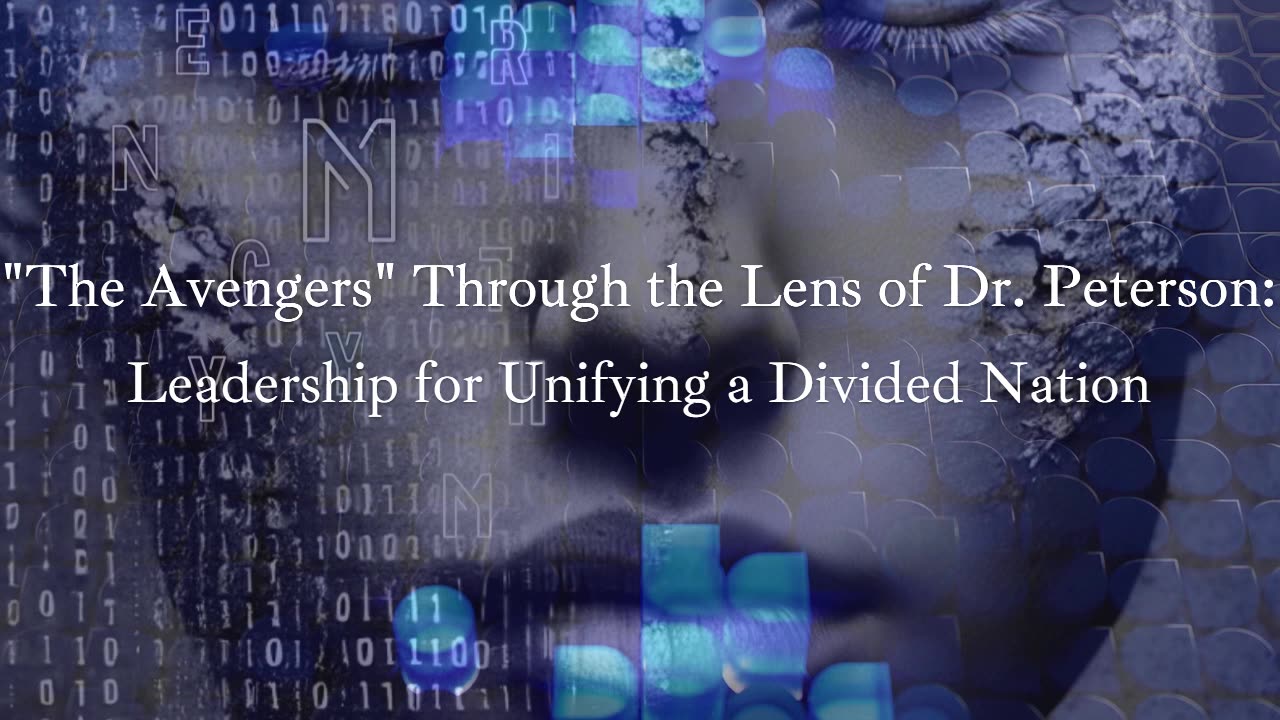
Episode 6 "The Avengers" Through the Lens of Dr. Peterson: Leadership for Unifying a Divided Nation
Briefing Document Date: December 1, 2024
Source 1: Peterson Discusses Trump, Elon Musk, and the "Woke Mind Virus"
This section starts with a provocative statement on motherhood and age before transitioning to a discussion of the "psychological epidemic" of identity politics and the misuse of mental health as a shield for bad behavior. Peterson argues that societal overemphasis on victimhood leads to an inability to recognize genuine malevolence.
2. The "Woke Mind Virus" and Transgender Issues
Peterson delves into the "Woke Mind Virus" concept, using Elon Musk's personal experience with his transgender child as a starting point. He criticizes the medical and social pressures around transitioning, particularly for young people, and condemns the "sterilization and mutilation of children."
3. Weaponization of Mental Health and Psychopathy
The conversation shifts to the problematic trend of weaponizing mental health to excuse criminal behavior. Peterson draws on his clinical experience to explain the nature of psychopathy, arguing that compassion should not blind individuals to the reality of evil.
4. The Importance of Articulation and Building a "Substructure"
Peterson shares insights on the importance of articulate speech and the power of building a "substructure" of capable people to handle responsibilities. He emphasizes honesty in communication and the value of surrounding oneself with trustworthy individuals.
5. Trump, Ukraine, Climate Change, and Entrepreneurial Guilt
This section covers a wide range of political and social topics. Peterson discusses Trump's presidency, the war in Ukraine, climate change skepticism, and the "idiot guilt" often felt by successful entrepreneurs. He advocates for a policy of "invitation" over force and the rejection of leftist propaganda about property and success.
6. Rapid Fire Questions and Closing Thoughts (1:07:59 - 1:25:02)
The interview concludes with rapid-fire questions revealing Peterson's preferences in literature, philosophy, and travel. He emphasizes the importance of using intelligence responsibly and the concept of "infinite possibility" in life and entrepreneurship.
Source 2: Peterson on Responsibility, Opportunity, and Navigating a Complex World
1. Personal Reflections and Navigating Opportunities
Peterson reflects on the challenges and opportunities that come with his public persona, emphasizing the need for a clear vision and a supportive team to prioritize effectively. He reveals the intricate network of individuals who assist him in navigating the demands of his work.
2. The Importance of "Good Taste" and Building Trust
He highlights the critical role of "good taste" in managing public perception and the importance of treating everyone well, particularly as one's influence grows. He emphasizes that consistent excellence and ethical behavior are essential for building lasting trust.
3. Scaling Responsibility and the Power of Saying "No"
Peterson delves into the principles of scaling responsibility by creating a strong infrastructure and learning to prioritize ruthlessly. He underscores the value of identifying what NOT to do and focusing on areas of maximum impact.
4. Recognizing Psychopathy and the Dangers of Groupthink
The conversation explores the contagious nature of psychopathy and the dangers of groupthink, especially among those with antisocial tendencies. Peterson uses historical examples to illustrate the negative consequences of amplifying such behavior through group dynamics.
5. Mastering Articulation and Finding Your Voice
Peterson shares practical advice on mastering articulation, emphasizing the importance of eliminating filler words, being present in the moment, and speaking with conviction. He encourages individuals to risk failure and embrace exploration in their communication.
6. Engaging with Critics and Staying True to Your Principles
This section examines Peterson's approach to engaging with critics and maintaining composure in challenging situations. He discusses his strategy of assuming good faith initially and his ability to recognize manipulative tactics. He stresses the importance of staying true to one's principles and being prepared to face consequences.
Briefing Doc: A Review of Jordan Peterson's Ideas and Collaborations
This briefing doc analyzes a series of interviews and discussions featuring Dr. Jordan Peterson, a renowned clinical psychologist and public intellectual. The sources reveal recurring themes in Peterson's thinking, including his views on:
1. Societal Decay and the Demoralization of Young Men:
Peterson expresses deep concern about the state of Western societies, particularly the demoralization of young men and the decline in marriage and childbirth. He cites alarming statistics:
"50% of women 30 and under are now childless in the west 50% and half of them will never have a child and 90% of them will regret it."
He sees this trend as a "psychological epidemic" with profound implications for the future.
2. The Weaponization of Mental Health and the Rise of Victimhood Culture:
Peterson critiques what he perceives as the excessive focus on mental health and the tendency to frame every instance of misbehavior as a manifestation of victimhood. He argues that this narrative:
"Dements the entire field of discourse to everyone's downfall."
Creates a "proclivity to presume that everyone who's misbehaving is a victim who needs sympathy."
He warns against the dangers of overlooking genuine malevolence and failing to hold individuals accountable for their actions.
3. The Importance of Personal Responsibility and Truth-Telling:
Peterson consistently emphasizes the need for personal responsibility and the courage to speak truth, even when it is unpopular. He advises individuals to:
"Figure out what your priorities are," establish a clear vision for the future, and pursue opportunities aligned with that vision.
"Say what you believe to be the case," avoid manipulative speech, and build a foundation of trust through honesty.
"Give up everything they want," meaning to resist attempts at coercion and to be willing to face the consequences of standing by one's principles.
4. The Power of Storytelling and the Dangers of Ideology:
Peterson acknowledges the power of narratives in shaping our understanding of the world. He argues that:
"A description of the way that we prioritize the facts is a story."
"Stories based on power are inefficient and they breed internal dissent and rebellion, they fail."
He criticizes postmodernist and Marxist ideologies, which he believes promote narratives of oppression and resentment, leading to societal dysfunction.
5. Donald Trump and the Emergence of the "X-Men":
Peterson offers a nuanced analysis of Donald Trump, recognizing both his strengths and weaknesses. He sees Trump as:
"A brash salesman sort of character," a "huckster" with a "superpower" for using nicknames effectively.
"An unbelievably sophisticated 13-year-old bully."
However, Peterson also acknowledges Trump's positive impact, particularly his economic policies and his ability to attract a team of highly capable individuals, whom he dubs the "X-Men." These include:
Elon Musk: Peterson admires Musk's genius, efficiency, and "pro-human" orientation, believing he has the potential to bring positive change to government.
Robert F. Kennedy Jr.: Peterson sees Kennedy as a highly intelligent and well-informed individual with a deep understanding of history and a strong commitment to truth.
Tulsi Gabbard: Peterson appreciates Gabbard's sanity, stability, and agreeableness, qualities he believes are essential for effective leadership.
Vivek Ramaswamy and J.D. Vance: Peterson views these individuals as talented and promising figures who contribute to the diversity and strength of Trump's team.
Peterson expresses hope that this unconventional team can challenge the established order and revitalize American society. He urges his audience to participate in the political process, emphasizing that:
"Those DC-bound Avengers are going to need plenty of help, and all of you watching and listening should understand that failure looms unless you are there to do your part."
Conclusion:
This analysis reveals Jordan Peterson's critical perspective on contemporary culture and his belief in the importance of personal responsibility, truth-telling, and individual empowerment. He sees hope in the emergence of unconventional leaders like Trump and his "Avengers" team, but stresses the need for widespread citizen engagement to ensure their success in tackling the challenges facing Western societies.
Source 3: Peterson on Trump's Persona and Political Power
1. Trump's Unconventional Rise to Fame and Political Power
Peterson observes the unusual trajectory of Trump's success, from TV star to real estate magnate to president. He describes Trump as a "sophisticated 13-year-old bully" with an unmatched talent for using nicknames as a form of power.
2. A Family Man with a "Good" Side
Despite his flaws, Peterson acknowledges the positive aspects of Trump's personality, pointing to his strong family ties and the genuine faith placed in him by those who know him personally.
Source 4: The Mystery of Trump's Critics and Erosion of Trust
1. The Enigma of Anti-Trump Sentiment
Peterson expresses his bewilderment at the intensity of animosity directed at Trump, suggesting classism and resentment towards his brash persona as contributing factors. He acknowledges Trump's "huckster" qualities while defending the role of salesmanship in American success.
2. The Chilling Effect of Political Persecution
He argues that the relentless attacks on Trump raise legitimate concerns about the erosion of democratic norms and the potential for future persecution against anyone who supports him. This fear, he emphasizes, is deeply troubling and signifies a decline in trust within American institutions.
Source 5: A Deeper Look at Trump's Personality and His "X-Men"
1. Initial Skepticism Towards Trump's Candidacy
Peterson admits to sharing the initial skepticism many felt towards Trump's presidential aspirations, viewing his campaign as a potential marketing ploy rather than a genuine bid for leadership.
2. A Psychological Analysis of Trump's Character Traits
This section presents a detailed analysis of Trump's personality, drawing on the Five Factor Model of personality traits. Peterson argues that Trump demonstrates a unique combination of low agreeableness (specifically politeness), high conscientiousness (industriousness), and low neuroticism (withdrawal). He assesses these traits in relation to Trump's behavior and decision-making.
3. The Surprising Alliance with Elon Musk and Reassessing Trump
Peterson delves into the unexpected alliance between Trump and Elon Musk, noting the paradox of a supposedly narcissistic individual welcoming someone who surpasses him in fame, power, and intellect. He speculates that this partnership suggests a more nuanced and less self-centered nature than initially perceived.
4. Elon Musk: Genius, Neurotic, Efficient, and Ultimately "Good"
Peterson provides a positive assessment of Elon Musk, highlighting his exceptional intelligence, work ethic, and commitment to ambitious goals. He concludes that Musk is a "good man" or at least "trying very hard to be good," a crucial quality in positions of immense power.
5. Robert F. Kennedy Jr.: Historic, Prophetic, and Skeptical
The analysis shifts to Robert F. Kennedy Jr., whom Peterson describes as possessing high verbal intelligence, intense focus, and deep historical knowledge. He acknowledges Kennedy's skepticism towards established institutions and his potential to attract a diverse range of supporters.
6. Tulsi Gabbard: Stable, Authentic, and a Voice of Reason
Peterson briefly praises Tulsi Gabbard for her stability, authenticity, and ability to offer reasoned perspectives, qualities that would contribute valuable balance to a diverse team.
7. Vivek Ramaswamy: Visionary, Energetic, and Potentially Transformative
He describes Vivek Ramaswamy as a visionary entrepreneur with infectious energy and a powerful vision for change. Peterson speculates on Ramaswamy's potential to significantly disrupt established systems and bring about positive transformation.
8. The Importance of Citizen Participation and the Power of Voting
Peterson concludes with a call to action, urging individuals to engage in their civic duty and actively participate in shaping their future. He emphasizes the importance of voting and recognizes the collective responsibility needed to support leaders who are striving for positive change.
-
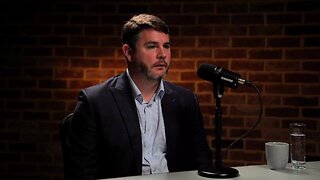 1:08:42
1:08:42
Winston Marshall
5 hours ago“This Is a Ticking Timebomb!” Trump’s Unlikely Coalition & The Woke Right w/James Lindsay
20.8K5 -
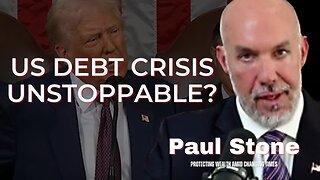 24:32
24:32
Rethinking the Dollar
5 hours agoWhy Washington Will NEVER Fix the Debt Crisis w/ Paul Stone
8.43K1 -
 4:40:22
4:40:22
Viss
6 hours ago🔴LIVE - PUBG New Extraction Shooter Coming Soon? - PUBG
28.7K2 -
 51:11
51:11
PMG
19 hours ago $0.22 earnedHannah Faulkner and Chloe Castillo | Is your music IMPACTING you?!
8.04K -
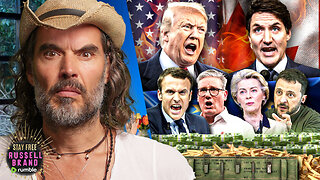 1:07:36
1:07:36
Russell Brand
6 hours agoTariff War Begins: Trudeau Threatens Retaliation Against Trump – SF549
117K87 -
 1:51:07
1:51:07
vivafrei
6 hours agoGuest "Misfit Patriot" on Andrew Tate & Casey Anthony! Canada Goes Full Trade War! ACB = DEI?
79.3K32 -
 1:58:22
1:58:22
The Charlie Kirk Show
5 hours agoCharlie vs. Gavin Newsom | Jonathan "Lomez" Keeperman | 3.6.25
128K70 -
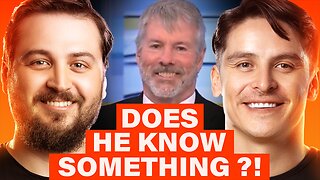 1:15:59
1:15:59
Simply Bitcoin
5 hours ago $2.90 earnedCould The NEXT 24 Hours Change The 2025 Bitcoin Bull Market? | EP 1197
38.5K3 -
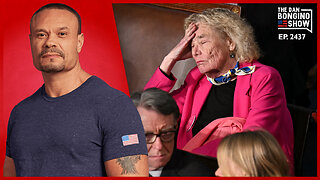 49:57
49:57
The Dan Bongino Show
7 hours agoAnother Phony Narrative Crumbles + First Show In The New Studio! (Ep. 2437) - 03/06/2025
862K2.35K -
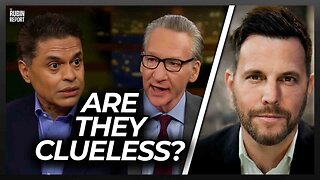 44:26
44:26
The Rubin Report
6 hours ago'Real Time' Crowd Stunned by Bill Maher’s Unexpected Glaring Blind Spot
92.9K57